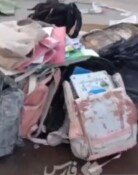Reports from Hiroshima on 60th Anniversary of Atomic Bombing
Reports from Hiroshima on 60th Anniversary of Atomic Bombing
Posted August. 06, 2005 06:18,
Memorial Ceremony Turns into Anti-U.S. Protest-
The 36th memorial service was held at 10:00 a.m. on August 5 in front of a memorial monument for Korean atomic bomb victims in a park, with the presence of about 300 people including Korean Japanese and students. Among those who gathered there and prayed for peace in the hope of not seeing another tragedy were some 20 Japanese girl scouts who attracted attention.
Nishimura Yuko (16), a second grader in high school who visited there for the first time said, I have never learned that there were Korean victims of atomic bombs in history classes. I plan to study the forced draft and I will to get along well with Koreans.
In many parts of the park, members of civic groups were gathering signatures for anti-war and anti-nuclear movements.
Join us in asking for an apology from the U.S. for killing innocent children, women and the elderly.
At the appeal for signatures, Japanese people, who came from provinces by large-sized buses to visit the shrine, came forward to write their signatures.
From a car of civic groups parked at a bus station came an announcement that anti-atomic bomb protest will be held on August 6 along with continuous anti-U.S. propaganda.
Takano, a young member of a civic group in the car, said, Even without the dropping of atomic bombs, the war would have ended. Nevertheless, the U.S. unilaterally conducted the brutal massacre in an attempt to attack and dominate Japan. He decried the inhumane act of the U.S. When asked about his opinion on Japanese war crimes, however, he replied with an awkward facial expression, Well, I dont know.
In the park, there was an exhibition of photos showing disastrous scenes such as burned human bodies right after the bombing. Much focus was placed on the damage from the atomic bombing of Japan, but none on the misery caused by Japanese aggression in Asian countries.
A woman in her 50s who guided the memorial photo exhibition for the 60th anniversary of the atomic bombing in Hiroshima insisted that people in Asian countries should join forces with us and mount an anti-nuclear movement. But when asked why there were no photos illustrating the miseries Japan caused Asian countries to suffer, she equivocated that this exhibition is designed for remembering the atomic bombing.
Lessons Fade Away-
There is a memorial monument for atomic bomb victims built in 1952 in Peace Memorial Park. On July 26, a member of a Japanese nationalist group was arrested by the police for damaging the monument. Where the monument was inscribed, May you rest in peace. Wrong doings will never be repeated, he damaged the word wrong doings with a hammer. He told the police that he did so because the Japanese people had done nothing wrong.
For the upcoming ceremony scheduled on August 6, the monument was restored. Within a stone chamber of the monument lies a list of names of 237,062 victims (including some 120,000 victims who died right after the bombing and those who died from the aftereffects of the bombing, as of late May).
When asked his opinion, a citizen who paid tribute to the monument with his family members asked for anonymity and looked around the park deplorably. And he said, We are witnessing things that were unimaginable in the past. He voiced his concern about the current trend in Japan of denying Japanese aggression and atrocities.
According to a survey conducted by the Asahi Shimbum of 13,000 Japanese across the nation, 62 percent of the respondents said, The U.S. should apologize and over 50 percent replied that the responsibility for the war falls on both the U.S. and Japan.
The scenes in the park on August 5 reflect the Japanese common sense that Korean and Chinese people, who suffered from Japanese aggression, find hard to accept.
Hun-Joo Cho hanscho@donga.com





![‘부화방탕 대명사’ 북한 2인자 최룡해의 퇴장 [주성하의 ‘北토크’]](https://dimg.donga.com/c/138/175/90/1/wps/NEWS/IMAGE/2026/02/27/133414028.1.jpg)

